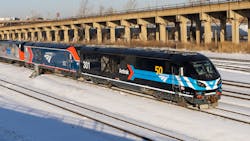FRA launches Climate Challenge aimed at getting rail industry to net zero GHG emission
The Federal Railroad Administration (FRA) launched a Climate Challenge for the U.S. rail industry on April 22, the 52nd commemoration of Earth Day.
A similar initiative was launched at the Federal Transit Administration (FTA) in June 2021 and, like the FTA Climate Challenge, the FRA Climate Challenge is designed to support the Biden Administration’s goal of reducing economy-wide net greenhouse gas (GHG) pollution.
FRA is asking owners and operators along the national rail network and manufacturers of rail equipment to join FRA’s commitment to reach net-zero GHG emissions in the rail industry and rail transportation by 2050. FRA says achieving this target will contribute to the agency’s key goals of building a safe, efficient and modern transportation system that will expand economic opportunities, create cleaner and safer communities and help avert the worst effects of climate change. Simultaneously, FRA’s Climate Challenge will promote the country’s global leadership in innovation and climate protection.
“FRA commits to supporting innovation in the rail industry to keep rail one of the most sustainable transportation choices,” said FRA Administrator Amit Bose. “Together, we will expand access to passenger and freight rail, ensure that they are powered by environmentally-friendly technologies and eliminate emissions across the rail supply chain.”
FRA explains the Climate Challenge builds on the strengths of rail transportation by encouraging the rail industry to decarbonize its operations, which will ensure that rail continues to be a model of sustainability and resiliency well into the future. Currently, freight rail is up to 75 percent more efficient than truck transportation, while passenger rail is up to 46 percent more efficient than driving and 34 percent more efficient than flying.
FRA notes its work with industry partners has delivered positive results such as working with Amtrak to develop biodiesel fuels for locomotives and funding programs dedicated to battery and electrification technologies, as well as conducting ongoing research on the feasibility of hydrogen fuel cells as alternatives to diesel use.
This collaborative work will continue and expand. For example, FRA is partnering with the Environmental Protection Agency’s SmartWay program, which emphasizes supply chain sustainability by helping freight transportation companies measure, benchmark and improve their energy efficiency.
FRA also notes the rail industry’s ability to meet climate goals is supported by the funding included in the Bipartisan Infrastructure Law, which includes funding dedicated to expanding passenger rail access and improving the freight rail network through FRA’s competitive discretionary grant programs, enabling modal shift away from less energy efficient modes of travel.
About the Author
Mass Transit Staff Report
Stories under this byline were produced through a team effort by the editorial staff of Mass Transit.
To learn more about our team, click here.
If you have a story idea, let us know by emailing [email protected]. Please review our contributor guidelines found here.
